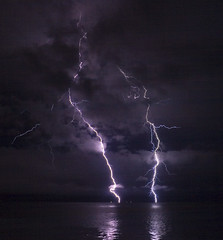Sometimes, the right word isn’t the more succinct option. For example, I once (just once) read a medical murder mystery. In the climactic action scene, the villain picked up a [obscure medical device] and snuck up on a character.
 BAM. I put the book down and hit the Internet. (Okay, I actually finished the scene. I wanted to see if I could figure it out in context. Nope: I was mightily confused because [OMD] played a big role in the scene—the villain injured the character with it, I think—and I had no idea what [OMD] might look like or how it’d make that kind of wound.)
BAM. I put the book down and hit the Internet. (Okay, I actually finished the scene. I wanted to see if I could figure it out in context. Nope: I was mightily confused because [OMD] played a big role in the scene—the villain injured the character with it, I think—and I had no idea what [OMD] might look like or how it’d make that kind of wound.)
So I looked up [OMD] (she used the name, of course, but I don’t remember it). Pretty wicked looking thingy. Knowing that it had an inch-wide metal spike might have helped me a.) not be so confused and b.) actually worry about the character.
Granted, the word was probably in the character’s realm of knowledge. But we have to balance the characters’ vocabulary against the audience’s: even if your character can use the word jabot in conversation, if your audience can’t understand it, is it the right word?
Conversely, there are reasonable limits to our pandering. One of my favorites here is a friend of mine who had her work critiqued by a college-level creative writing class. One member of the class told her not to use a word because he didn’t know what it meant. The word? Betrothed.
What do you think? Does every word have to be transparent to the lowest common denominator? At what level do we need to do more to describe or explain something our characters never think about?
Photo by Ian Boggs


I occasionally have a crit partner who wants me to drop a word because s/he didn’t know it. That’s a smile and say ‘thank you’ moment. I don’t want to use arcane words (unless I’m writing about magic), but I don’t dumb down my writing. If the POV character would use that word, I keep it.
I do try to explain odd words like the OMD (or magic), especially if it’s going to do damage!
In my children’s books, I sometimes use a word that a character makes up. I explain what the word means the first time the character uses it, then I just write it with no explanation.
I had to think about this a lot in my book. It’s set in Hawaii, where they use a lot of words that nobody else does, and some words have different meanings. (Don’t call them “flip-flops” – they’re slippers. )
Since I’m hoping my readership will include both those familiar with the Hawaiian lingo and those that aren’t, I had to walk this line carefully. Too far on one side, and some readers will feel pandered to. Swing the other way, and some readers won’t have a clue what I’m talking about.
For some words, I relied on context. For others, I had one character define it for another. I tried to avoid definitions in the narrative, but did end up using that a couple of times. Hopefully I did it right.
In your example above, I would have made sure the [OMD] was introduced and clearly described earlier in the story, so that by the climax all readers knew darn sure it was trouble.